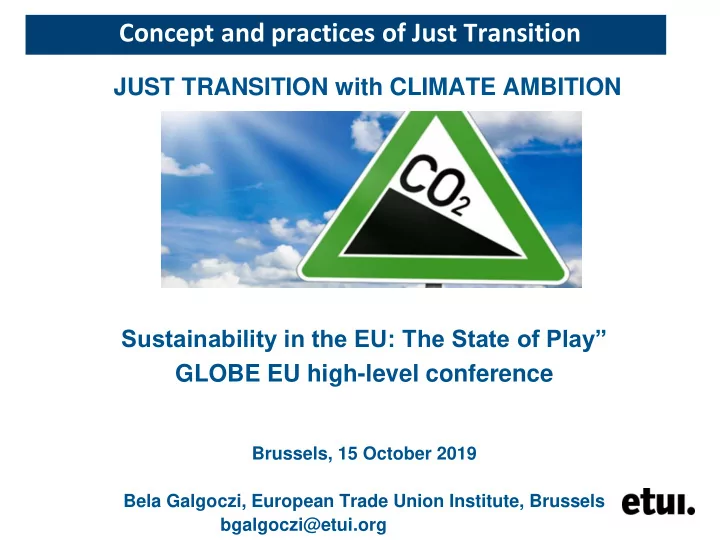

Concept and practices of Just Transition JUST TRANSITION with CLIMATE AMBITION Sustainability in the EU: The State of Play” GLOBE EU high-level conference Brussels, 15 October 2019 Bela Galgoczi, European Trade Union Institute, Brussels bgalgoczi@etui.org
Compelling necessity: Revision of growth model Climate emergency is widely recognised by now So, the clock is ticking...and this is more and more recognised A fundamental revision of our energy and resource depleting growth model is necessary reach net-zero carbon economy by 2050 Just transition is the (only) way to make it.. With massive effect on jobs i n the entire economy: Jobs to be created, but also lost, but all jobs affected The inevitably needed higher climate ambition will have much higher social and employment effects than previously seen or thought 2
Just transition: – wrap up - NOT `Just another transition` JT is about `just burden sharing`, with different dimensions: ● Addressing climate and environmental justice (global North <> gobal South, historical + inter-generational ● Dealing with distributional effects of climate policies (FiT, carbon price, ETS design during the transition), ● + managing job transitions (More than a `fancy funeral`) ● regional restructuring (industrial policy, regional development) ● decent work and inclusive society in a zero-carbon world ● `just transition` became a mainstream narrative, danger of hollow-out/overstretching
Dimensions of inequality in the climate change context ● Outcome : decent jobs (ILO) in a zero-carbon inclusive society: traditional jobs - good organised jobs; new green jobs often precarious; ● Process : getting there, how job transitions are managed (nobody left behind, just burden sharing, managing social impacts), revitalise local economy – social dialogue at all levels There is no genuine trade-off between green-labour and social dimensions – still, during the transition these may appear JT is not an abstract concept, but a real practice in real workplaces. Objective is common, but concrete transitions take place in real work environments determined by the capital-labour relationship
The concept of `Just transition`: an early trade union demand, now mainstream Many questions arise, inequality has a lot of cross-cutting dimensions, (e.g. housing, mobility, energy) ● The concept of JT is multi-faceted, has different dimensions and contexts, also theoretical backgrounds – cross-cutting each other ● Must be implemented in form of concrete strategies and actions that are matched to concrete economic, social and institutional context that differs by country, region and economic branch ● There is no silver bullet of just transition, but some common principles established (the 2015 ILO Guidelines make a useful contribution)
Varieties of JT: illustration from two sectors ● Differences by economic branch are also substantial: ● A JT strategy for the energy sector (e.g phasing out coal) needs different approaches than e.g. in the automobile sector ● Decarbonisation (in sectors) has different interlinkages to other megatrends (as e.g. digitalization /auto/, demography /mining/) Coal: less than a tenth of a percent of EU jobs but concentrated in a few countries and regions. Targeted and comprehensive labour market policy measures; regional policies are key Company good practice: ENEL Italy, comprehensive framework agreement for phase-out of 23 coal fired power plants by 2029 Automobile : 3.4 million direct manufacturing jobs, total 13.8 M in EU > total overhaul of the industry and its value chains Plant level agreements: Daimler, VW, Schaeffler – job protection, investments, innovation, skills development
Trade union role focus not just on core workers (members), but on all – Status quo is no solution, change is inevitable: managing change in an advance looking way Time horizon is crucial: short term vs long term interest (jobs of here and now vs future jobs) Transition time is also important in order to get prepared New innovative organisation strategies Coalition building : trade unions and environmental justice groups (blue-green alliances) – more developed in North America, in the EU not yet an established practice
Recommend
More recommend